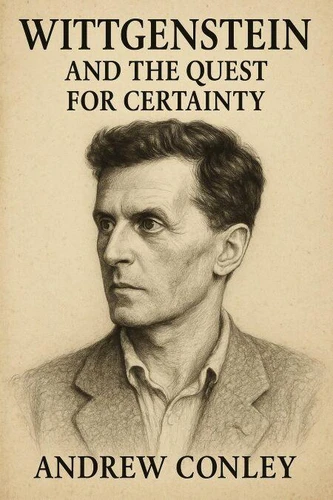Wittgenstein and the Quest for Certainty
Par :Formats :
Disponible dans votre compte client Decitre ou Furet du Nord dès validation de votre commande. Le format ePub est :
- Compatible avec une lecture sur My Vivlio (smartphone, tablette, ordinateur)
- Compatible avec une lecture sur liseuses Vivlio
- Pour les liseuses autres que Vivlio, vous devez utiliser le logiciel Adobe Digital Edition. Non compatible avec la lecture sur les liseuses Kindle, Remarkable et Sony
 , qui est-ce ?
, qui est-ce ?Notre partenaire de plateforme de lecture numérique où vous retrouverez l'ensemble de vos ebooks gratuitement
Pour en savoir plus sur nos ebooks, consultez notre aide en ligne ici
- FormatePub
- ISBN8227265456
- EAN9798227265456
- Date de parution18/04/2025
- Protection num.pas de protection
- Infos supplémentairesepub
- ÉditeurBig Dog Books, LLC
Résumé
Wittgenstein and the Quest for Certainty by Andrew Conley explores Ludwig Wittgenstein's profound shift in philosophical thought, from his early work in the Tractatus Logico-Philosophicus to his later, groundbreaking ideas in the Philosophical Investigations. The book delves into Wittgenstein's evolving conception of certainty, challenging the traditional search for indubitable truths in favor of a view that emphasizes the social, contextual nature of meaning and knowledge.
Conley traces Wittgenstein's critique of metaphysical certainty, his rejection of private language, and his focus on the practical use of language in everyday life. By examining how Wittgenstein's ideas dissolve traditional philosophical problems, this work offers a fresh perspective on the quest for certainty, positioning Wittgenstein's later philosophy as a critical response to the intellectual traditions that preceded him.
Through an in-depth analysis of Wittgenstein's rejection of abstract systems in favor of ordinary language, the book highlights how his philosophy continues to influence contemporary thought in fields like ethics, epistemology, political theory, and the philosophy of mind.
Conley traces Wittgenstein's critique of metaphysical certainty, his rejection of private language, and his focus on the practical use of language in everyday life. By examining how Wittgenstein's ideas dissolve traditional philosophical problems, this work offers a fresh perspective on the quest for certainty, positioning Wittgenstein's later philosophy as a critical response to the intellectual traditions that preceded him.
Through an in-depth analysis of Wittgenstein's rejection of abstract systems in favor of ordinary language, the book highlights how his philosophy continues to influence contemporary thought in fields like ethics, epistemology, political theory, and the philosophy of mind.
Wittgenstein and the Quest for Certainty by Andrew Conley explores Ludwig Wittgenstein's profound shift in philosophical thought, from his early work in the Tractatus Logico-Philosophicus to his later, groundbreaking ideas in the Philosophical Investigations. The book delves into Wittgenstein's evolving conception of certainty, challenging the traditional search for indubitable truths in favor of a view that emphasizes the social, contextual nature of meaning and knowledge.
Conley traces Wittgenstein's critique of metaphysical certainty, his rejection of private language, and his focus on the practical use of language in everyday life. By examining how Wittgenstein's ideas dissolve traditional philosophical problems, this work offers a fresh perspective on the quest for certainty, positioning Wittgenstein's later philosophy as a critical response to the intellectual traditions that preceded him.
Through an in-depth analysis of Wittgenstein's rejection of abstract systems in favor of ordinary language, the book highlights how his philosophy continues to influence contemporary thought in fields like ethics, epistemology, political theory, and the philosophy of mind.
Conley traces Wittgenstein's critique of metaphysical certainty, his rejection of private language, and his focus on the practical use of language in everyday life. By examining how Wittgenstein's ideas dissolve traditional philosophical problems, this work offers a fresh perspective on the quest for certainty, positioning Wittgenstein's later philosophy as a critical response to the intellectual traditions that preceded him.
Through an in-depth analysis of Wittgenstein's rejection of abstract systems in favor of ordinary language, the book highlights how his philosophy continues to influence contemporary thought in fields like ethics, epistemology, political theory, and the philosophy of mind.






















